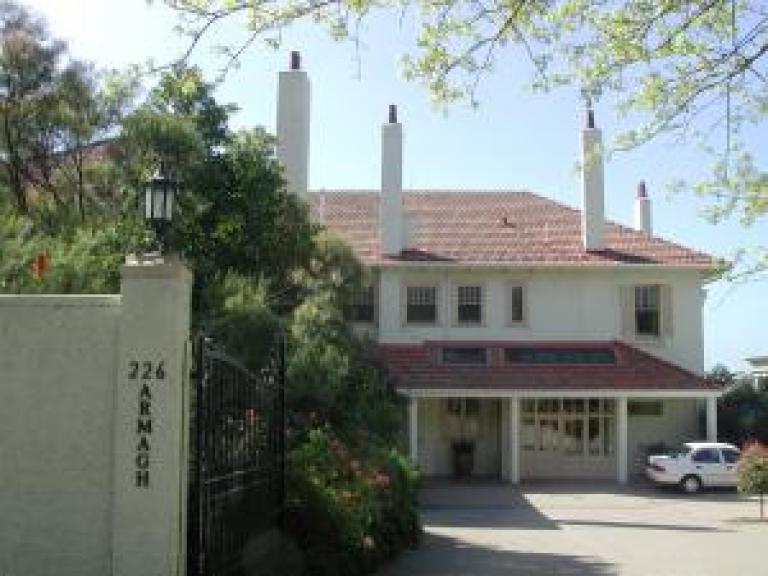
Australian Federal Treasurer Peter Costello and his wife Tanya were among the 200 guests at a dinner to celebrate the 50th anniversary of the gift of ‘Armagh’, a large mansion in Toorak, Melbourne, to the work of Initiatives of Change.
Costello, who is the local Federal MP, recalled coming as a student to a conference at Armagh 30 years ago and said, ‘There's been a lot of talk tonight about Armagh as a house but as we all know it's the people that make a home… When you talk about changing lives it's not empty rhetoric, it's born out of your experiences... we need organisations like this that contribute so much to the character of our society and to the character of the region and the world.’
Earlier in the evening, James Coulter, who had returned to Australia to work with MRA after flying Sunderland flying-boats in World War 2, told guests how he had consulted Frank Buchman, the initiator of MRA, in 1956 about the need for a centre in the Australia-Pacific area. Cecil McKay, a wealthy industrialist and philanthropist, had just put his family home, Armagh, on the market and Coulter and his colleagues intended to make him an offer well below the market value. “Frank [Buchman] mused that he thought Mr McKay may laugh in our faces,” said Coulter, “but that if this was our conviction we had better go ahead.
‘Cecil McKay was warm in his welcome but came directly to the point: ‘I gather you want my home, but how much?’ When we told him our figure, as Frank had surmised, he burst out laughing; but thanked us for coming. We left our letter of offer and a deposit.
Some weeks later McKay had contacted Coulter and one of his colleagues to say that he had decided to give Armagh to Moral Re-Armament outright because he felt ‘MRA was a force for good in a troubled world’.
‘It was totally unexpected,’ said Coulter, ‘we were left speechless. We felt it was God’s doing and got on our knees to thank Him.’
McKay’s main condition was that his gift was to be completely confidential, and it remained so until McKay’s widow wrote about it in her biography of her husband nearly 20 years later.
Jim Beggs spoke about coming to Armagh in 1956 as a young wharfie, suspicious of its grandeur and location in Toorak – Melbourne’s wealthiest suburb – but nevertheless ‘captured by the spirit of the people we met and the sacrifices made to keep it going’. At the time the waterfront was a hotbed of militant politics and was responsible for nearly 30 per cent of the industrial disputes in the country.
Beggs and his wife Tui started to invite men from the waterfront to meetings at Armagh ‘to see what we had found - a new unity between us through honesty,’ and to meet Bunny Austin, a former Davis Cup tennis star who was living there. ‘Our lads were all boxers and their leader was known as “the washing machine” because he was such an agitator. At one point in his talk Austin said “Moral Re-Armament is a bit like boxing: if you are going to succeed you need to give more than you take.” It was a point we understood.’ In 1961 Beggs and his team fought a campaign that resulted in a change of leadership on the waterfront and a new spirit of cooperation. Beggs himself went on to lead the Melbourne waterfront workers for 21years, including seven as national president of the Waterfront Workers Federation.
The celebrations of the 50th anniversary also included an Open Day on Sunday 8 October which highlighted some of Armagh’s current programs. These include residential training courses for young adults, interfaith and intercultural meetings, workshops to help people ‘discover the other’ and a series of dialogues between North and South Sudanese to help heal the rifts after decades of civil war.
People came from as far afield as Darwin, Launceston and New Zealand to attend the celebrations. Others who couldn’t attend sent messages:
I think the power of Armagh lies in its daily ‘quiet time’ and sharing where people can express their problems freely. I was... grateful when I could share my family problem which I had always kept secret. It enabled me to ask forgiveness from my Dad.’ – Bachrul Ilmi, Indonesia.
'I was respected as Dadan and I was also respected as a Muslim. I hope that Allah will give me a chance to stay at Armagh again so that I can increase my value as a human.' – Dadan Nugraha - Indonesia
‘It was the greatest experience of change I've had. Quiet time has become a conscience for my actions. It is more valuable than anything.’ – Phlong Pisith, Cambodia
‘I sensed the meaning of life every second of being there.’ – Ye Bo, China
‘Six months of an experience and a lifetime.......of growth - that's what I received from Armagh.’ – Bambi Kevichusa, Nagaland, North East India
‘The care of the Armagh community helped me find freedom as a person and gave me a firm faith for which I am endlessly grateful.’ – Laura Boobbyer, United Kingdom
